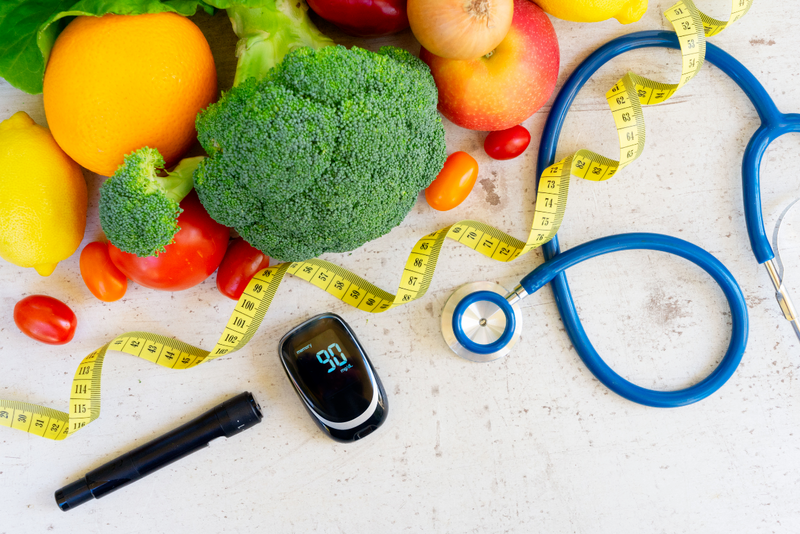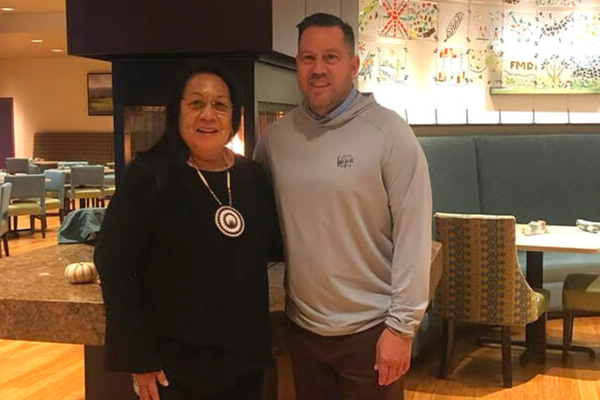
- Details
- By Stacy Thacker
- Health Care
A new program aimed at fighting diabetes in Indian Country is creating real change for participants. The 4D/Apollo Diabetes Prevention Program is designed to transform more than a diet; it’s designed to transform lifestyles.
“It’s not a crash-course diet," Pete King, founder of the 4D program, told Tribal Business News. The program is about changing habits that individuals may have had for years or families may have had for generations, he said.
King, a member of the Oneida Tribe, started the program about five years ago and has worked with three cohorts so far. The program is virtual and participants meet with coaches online.
“Losing weight is one thing, but getting healthy is a whole other aspect in creating longevity,” King said.
King was inspired to create an alternative to diabetes care after his father was diagnosed with the disease.
“My father actually was diabetic,” King said. “He went to my tribe and tried to do our diabetes program, (but) it was antiquated.”
King’s father was given a three-ring binder with healthy recipes for a diabetic diet, but he was left to his own devices when it came to figuring out how to shop for the ingredients and how to cook them. The lack of support was disappointing, and King felt his father needed more.
Although his father passed away two years ago, he is always on King’s mind. King thinks about what would have helped his father, and he takes those ideas and uses them to help other people.
King said the program's first three to four weeks are the hardest because people are slowly unraveling decades of learned behavior while figuring out why they’ve developed certain behaviors. It can be daunting, but once they break that barrier, everything changes.
“Then you really start to see it physically; you start to see it mentally. You start to sleep better, you start to feel better, your energy level starts to change and that gets addicting,” he said.
When a new cohort starts, individuals are given comprehensive health and behavioral assessments, including a blood panel. Participants also do a nutritional and exercise intake to help create individualized plans.
The program is a year long with a check-in at the six-month point. But, the clients aren’t on their own — they have ongoing support from a nutritionist and a health coach.
“Life coaching is so important because to me, you’re better as a team,” King said.
“If you can rely on somebody to talk to and get through issues that you may have throughout the program, that’s where the life coaches really come in to provide that support.”
King has seen clients break down crying because they are in a healthier state physically, mentally,and emotionally. The 4D program is something King hopes to share with other tribes.
He is working closely with regional partnerships and tribal consortiums, as well as the Midwest Alliance of Sovereign Tribes, to incorporate the program in Michigan, Wisconsin and Minnesota, he said.
When Louise Cornelius, gaming general manager at the Oneida Casino and Oneida tribal member, joined the program’s third cohort, it opened a new door for her.
Cornelius struggles with portion control and through the program, she’s been working on choosing the right foods and amount to eat.
“Really, the program is a self-commitment,” Cornelius said. “If you really want to improve your health conditions and overall health and well-being, this program is what it does. It’s all about educating you.”
Diabetes runs in Cornelius’ family. Through the program, she has learned more about the different types of sugar and processed foods and how to look for ingredients that make those foods unhealthy. As a result, she is more cautious about the ingredients she’s eating and putting into her body.
According to the Centers for Disease Control and Prevention, Native Americans have a higher chance than any other racial group to be diagnosed with diabetes.
“I’m overweight for my height, quite a bit, and so I’ve made quite a bit of adjustment in my lifestyle,” she said, adding she’s given up potatoes and bread and replaced them with healthier alternatives.
She isn’t doing it alone; her husband has also joined her in changing his lifestyle. Although he isn’t part of the program, he’s seen how beneficial it’s been, and he’s working toward getting healthy with Cornelius.
 4D cohort member Louise Cornelius and 4D founder Pete King. (courtesy photo)
4D cohort member Louise Cornelius and 4D founder Pete King. (courtesy photo)
“That’s made a big difference for me, having my partner eat the same foods,” she said.
For Tehassi Hill, chairman of the Oneida Nation, the 4D program has been beneficial in more ways than one. He’s lost weight and keeps it off while eating foods he likes, and because the program is virtual, he could always fit it into his schedule.
Hill was a part of the original cohort of 15 Oneida tribal members and participated at the height of the pandemic in 2020.
“I think the biggest surprise for me was how easy it was to lose weight with this program and not necessarily feeling hungry or things like that,” Hill said.
He hunts and fishes, so those were staple proteins in his diet, and it helped him to be able to eat foods relevant to his pre-existing diet while making them healthier.
Having the program in his community, Hill said, is important because he’s experienced what a difference it makes and believes the program can make a bigger impact.
“Making sure our weight and our diets are under control and helping to control things like diabetes and heart disease and maybe even stroke prevention, all these different serious health outcomes that our tribal members face daily, if we’re able to have this intervention early on or even while they’re having some of these issues, to help turn their health around and get back into a healthy space and then hopefully health care would be less of an issue for tribes,” he said.